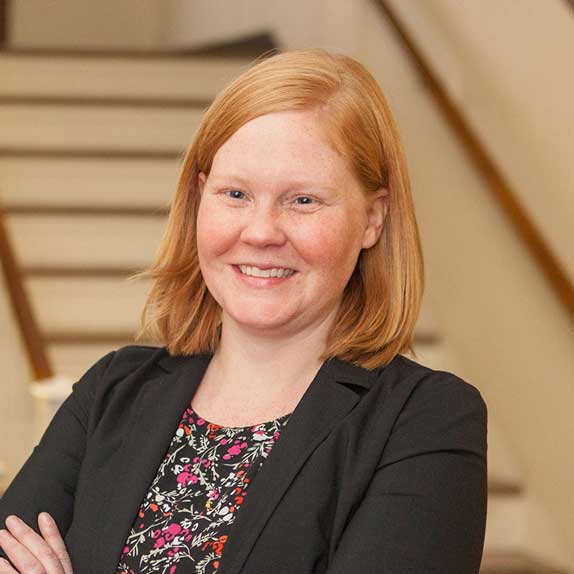A Conversation with Jacquelyn MacDonald, PhD, Program Director of MS in Applied Behavior Analysis
When she was selected in 2018 as Educator of the Year by The New England Center for Children (NECC), internationally renowned for education and research about children with autism, Jacquelyn MacDonald, PhD, BCBA-D®, LABA was no stranger to the organization. Prior to joining Regis College as Program Director of MS in Applied Behavior Analysis in 2014, MacDonald had served as a specialist in, respectively, professional, program and curriculum development at NECC for nearly eight years. The president and CEO of NECC hailed her as “an accomplished educator who not only has transformed the lives of children with autism, but whose influence in ‘teaching the teachers’ has spread the benefits of applied behavior analysis across the country.” Indeed, MacDonald is an evangelist for the profession, having co-hosted the popular podcast “ABA Inside Track” since 2016. Meet her here:
Just in case you did not grow up wanting to be an ABA therapist, can you describe the evolution of your own career aspirations?
When I was little, I wanted to be an actress and a writer (but don't we all?) We had an assignment in AP English class in high school to research something that we knew nothing about but wanted to know more. At that time I was interning at a residential facility for youth and one of the students that attended had a diagnosis of autism. I was fascinated and wrote my first paper about the origins of autism from a historical point of view. During my first year of undergraduate, I took a course on advanced learning. The class was formatted on a personalized system of instruction where students work at their own pace through units. Once you finish a unit, you were tested on the material individually with a TA and then you earned time with the professor. I was fascinated in the material and pursued a job working with a family with a young son recently diagnosed with autism. I worked in the family’s home around 20-30 hours per week. I went to a conference and met one of the great ABA researchers, Tristan Smith. He was so thoughtful and caring. Out of college, I got a job at The New England Center for Children where I really learned all about the science of ABA. I got to work with the greats in the field [and] was given so many opportunities during my time that the New England Center for children that it fostered my love for ABA.
When and how did you first become aware of ABA specifically and what were your initial impressions?
In undergraduate while working with the family in their home. I loved the child centered focus and the objective data collection that showed progress! I loved watching kids learn and grow with remarkable speed! I love to see language and play emerge in spontaneous and creative ways. I love that ABA can span across many fields, not just working in the field of special education such as gerontology, increasing social justice, gun safety, kindergarten readiness skills, and working with business to help with productivity and staff happiness and retention.
What are the most distinctive aspects of ABA that diverge from other therapeutic approaches?
ABA is a science of behavior. This allows our field to rely on previous scientific evidence to guide our decision making. ABA has become very client focused and works to provide culturally competent care to the whole individual or entity.
What are the top 5 (give or take) most frequent applications of ABA (i.e. autism, substance abuse, etc.)? Is there something they have in common that you think makes ABA particularly effective?
There probably is just one big one for ABA right now-working with autism and other related disabilities. ABA looks for change within the individual and uses data-based decision making to help teach behaviors that are socially significant and to reduce any barriers that may be the way of learning. This may be to decrease aggression or self-injury.
Who is the “typical” ABA therapist? What is their common motivation in being attracted to this approach?
I am not sure there is a typical ABA therapist. Most ABA therapists find ABA by seeing the drastic changes in individuals in school systems or love the science of behavior. We have seen young students, older students, parents of children with autism, and blended professionals (OT, SLP, and special educators).
If you think of the typical therapist in your profession demographically, are there populations that are not well represented that you think would be a particularly good fit and that you’d like to see represented in greater numbers?
This is one area in our field that we are looking to work on. The field does not tend to be very diverse based on the populations that we serve. It is our job as professionals to recruit persons of color, males as well as females, and persons from various cultures to help expand our cultural competence as a field and to help to represent all of the clients that we may serve.
ABA is fairly unique in that it seems to require both “left” and “right” brained aptitudes—that it is both very hard science yet firmly in the humanities as well. Does it make it challenging finding well equipped professionals given that relatively few of us are “ambidextrous”?
Yes, this is a challenge that our field is going through at the moment. Graduate programs tend to churn out behavior analysts that are very science and data driven but may not be as well versed in the soft skills that are required to work with the rest of the world and especially with families and clients. As a program, we have tried to specifically teach these softer skills to our students to provide them with all of the skills needed to be an effective science practitioner. The perfect candidate for the field of ABA is someone that is compassionate about people, excited about science, and willing to accept feedback!
Practically speaking, what are the most common jobs graduates are employed in? Can you share any information on the job outlook for the field?
Most commonly, people stay at their jobs that they work at throughout the entire duration of the program. We help them find a job in the field at the start of the program and may continue at that agency following graduation. However, our field has so many unique opportunities that are ways to branch out if students want to.


